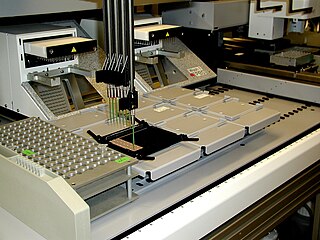
Bioinformatics is an interdisciplinary field of science that develops methods and software tools for understanding biological data, especially when the data sets are large and complex. Bioinformatics uses biology, chemistry, physics, computer science, computer programming, information engineering, mathematics and statistics to analyze and interpret biological data. The subsequent process of analyzing and interpreting data is referred to as computational biology.

The proteome is the entire set of proteins that is, or can be, expressed by a genome, cell, tissue, or organism at a certain time. It is the set of expressed proteins in a given type of cell or organism, at a given time, under defined conditions. Proteomics is the study of the proteome.

Proteomics is the large-scale study of proteins. Proteins are vital parts of living organisms, with many functions such as the formation of structural fibers of muscle tissue, enzymatic digestion of food, or synthesis and replication of DNA. In addition, other kinds of proteins include antibodies that protect an organism from infection, and hormones that send important signals throughout the body.

The SIB Swiss Institute of Bioinformatics is an academic not-for-profit foundation which federates bioinformatics activities throughout Switzerland.
Regulome refers to the whole set of regulatory components in a cell. Those components can be regulatory elements, genes, mRNAs, proteins, and metabolites. The description includes the interplay of regulatory effects between these components, and their dependence on variables such as subcellular localization, tissue, developmental stage, and pathological state.

UniProt is a freely accessible database of protein sequence and functional information, many entries being derived from genome sequencing projects. It contains a large amount of information about the biological function of proteins derived from the research literature. It is maintained by the UniProt consortium, which consists of several European bioinformatics organisations and a foundation from Washington, DC, USA.
The European Bioinformatics Institute (EMBL-EBI) is an intergovernmental organization (IGO) which, as part of the European Molecular Biology Laboratory (EMBL) family, focuses on research and services in bioinformatics. It is located on the Wellcome Genome Campus in Hinxton near Cambridge, and employs over 600 full-time equivalent (FTE) staff. Institute leaders such as Rolf Apweiler, Alex Bateman, Ewan Birney, and Guy Cochrane, an adviser on the National Genomics Data Center Scientific Advisory Board, serve as part of the international research network of the BIG Data Center at the Beijing Institute of Genomics.

Amos Bairoch is a Swiss bioinformatician and Professor of Bioinformatics at the Department of Human Protein Sciences of the University of Geneva where he leads the CALIPHO group at the Swiss Institute of Bioinformatics (SIB) combining bioinformatics, curation, and experimental efforts to functionally characterize human proteins.
Expasy is an online bioinformatics resource operated by the SIB Swiss Institute of Bioinformatics. It is an extensible and integrative portal which provides access to over 160 databases and software tools and supports a range of life science and clinical research areas, from genomics, proteomics and structural biology, to evolution and phylogeny, systems biology and medical chemistry. The individual resources are hosted in a decentralized way by different groups of the SIB Swiss Institute of Bioinformatics and partner institutions.
The Association of Biomolecular Resource Facilities (ABRF) is dedicated to advancing core and research biotechnology laboratories through research, communication, and education. ABRF members include over 2000 scientists representing 340 different core laboratories in 41 countries, including those in industry, government, academic and research institutions.

Endoplasmic reticulum protein 29 (ERp29) is a chaperone protein that in humans is encoded by the ERP29 gene.
Marc R. Wilkins is an Australian scientist who is credited with the defining the concept of the proteome. Wilkins is a Professor in the School of Biotechnology and Biomolecular Sciences at the University of New South Wales, Sydney.
neXtProt is an on-line knowledge platform on human proteins. It strives to be a comprehensive resource that provides a variety of types of information on human proteins, such as their function, subcellular location, expression, interactions and role in diseases. The major part of the information in neXtProt is obtained from the UniProt Swiss-Prot database but it is complemented by data originating from high-throughput studies with an emphasis on proteomics. neXtProt offers also an advanced search capacity based on the SPARQL technology as well as an API that allows to programmatically extract the data stored in the resource. It is developed by the CALIPHO group directed by Amos Bairoch and Lydie Lane of the Swiss Institute of Bioinformatics (SIB).

Rolf Apweiler is a director of European Bioinformatics Institute (EBI) part of the European Molecular Biology Laboratory (EMBL) with Ewan Birney.
Integromics was a global bioinformatics company headquartered in Granada, Spain and Madrid. The company had subsidiaries in the United States and United Kingdom, and distributors in 10 countries. Integromics specialised in bioinformatics software for data management and data analysis in genomics and proteomics. The company provided a line of products that serve gene expression, sequencing, and proteomics markets. Customers include genomic research centers, pharmaceutical companies, academic institutions, clinical research organizations, and biotechnology companies.
The Human Proteome Project (HPP) is a collaborative effort coordinated by the Human Proteome Organization. Its stated goal is to experimentally observe all of the proteins produced by the sequences translated from the human genome.
The 'German Network for Bioinformatics Infrastructure – de.NBI' is a national, academic and non-profit infrastructure initiated by the Federal Ministry of Education and Research funding 2015-2021. The network provides bioinformatics services to users in life sciences research and biomedicine in Germany and Europe. The partners organize training events, courses and summer schools on tools, standards and compute services provided by de.NBI to assist researchers to more effectively exploit their data. From 2022, the network will be integrated into Forschungszentrum Jülich.
Debasis Dash is an Indian computational biologist and chief scientist at the Institute of Genomics and Integrative Biology (IGIB). Known for his research on proteomics and Big Data and Artificial Intelligence studies, his studies have been documented by way of a number of articles and ResearchGate, an online repository of scientific articles has listed 120 of them. The Department of Biotechnology of the Government of India awarded him the National Bioscience Award for Career Development, one of the highest Indian science awards, for his contributions to biosciences, in 2014. He was appointed as the director of Institute of Life Sciences, Bhubaneswar on 18 May 2023.
FAM237A is a protein coding gene which encodes a protein of the same name. Within Homo sapiens, FAM237A is believed to be primarily expressed within the brain, with moderate heart and lesser testes expression,. FAM237A is hypothesized to act as a specific activator of receptor GPR83.








